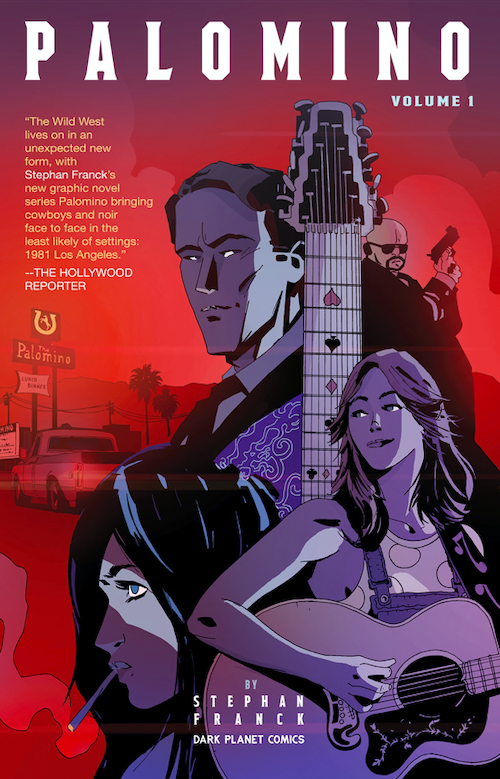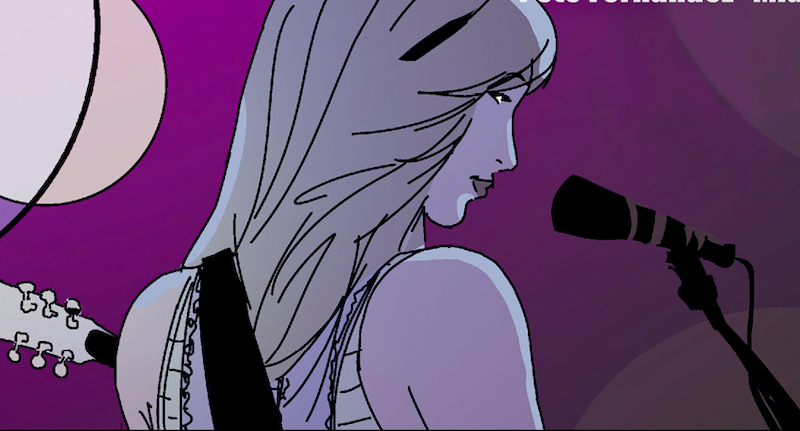INTERVIEW: Los Angeles’ country music clubs are setting for new neo-noir graphic novel
Photo: Image courtesy of Dark Planet Comics / Provided by Superfan Promotions with permission.
The many bygone eras of Los Angeles history have been dramatized numerous times by high-profile authors and artists. Whether it’s a James Ellroy murder mystery set in the 1940s or the modern police procedurals of Joseph Wambaugh, the City of Angels has inspired many creative types to fashion noir tales of femme fatales, inquiring private investigators and shadowy goings-on in the dimly-lit corridors of the enterprising city.
Stephan Franck, an award-winning writer and artist, is now putting his unique touch on a neo-noir tale set in the country music clubs of the 1980s. Palomino, the first part of a planned four-part series, is currently being funded through Kickstarter (until Wednesday, May 12 at 9:10 a.m. PDT / 12:10 p.m. EST).
In the graphic novel, which will be released by Franck’s Dark Planet Comics, the protagonist is Eddie Lang, an ex-cop turned working musician, according to the Kickstarter page. His music career hasn’t taken off, so Eddie is forced to be a private investigator, which is the only way he can put food on the table for his daughter, Lisette. Then, as inevitably happens in a noir tale, murder strikes, and Eddie finds himself at the intersection of violence, self-preservation and country music.
Because this is 1981, readers can expect plenty of references to Ronald Reagan, Farah Fawcett, Kenny Rogers and Dolly Parton. This is a mixture of honky-tonk culture and So Cal sentimentality.
Recently Hollywood Soapbox exchanged emails with Franck about the project. He is best known for being the lead animator on The Iron Giant, and he also contributed to the story of Despicable Me. He is the co-creator of the Nicktoons series Corneil & Bernie and founded Dark Planet Comics, an independent comic-books publishing company. Questions and answers have been slightly edited for style.
Where did the idea for Palomino come from?
Palomino came from the convergence of my love of noir stories and characters, and my fondness for playing in music clubs, which I have done since I was a teenager, including the L.A. country music clubs that I’ve played in since I moved here 25 years ago. Palomino takes place in Los Angeles in 1981, and it follows Eddie Lang, who is a former, disgraced cop, now a begrudging PI by day, and by night, a working musician playing pedal steel guitar in the house band of the historic Palomino Club in North Hollywood.
Most importantly, he is also a father to a teenage daughter named Lisette, who is just as hardboiled and prickly a character as he is. The two of them are linked by a very strong bond, which includes a sharp sense of humor; however, their family was struck by a terrible and unsolved tragedy from which they never have quite recovered. As we find them, they’re emotionally stuck, until a new crime wedges itself into the fabric of their lives and upsets the status quo.
You arrived to Los Angeles in 1995 and just missed the Palomino’s heyday. How did you hear about the club?
When I was a teenager in the mid ’80s in France, we had quite an active rockabilly subculture that had started with the Stray Cats and sort of taken hold. Our local supermarket was carrying records, and the store buyer was always stocking the shelves with awesome roots music — stuff that would have been crazy obscure for mainstream France. That would include all the Sun Records reissues before they were cool, pretty much anything by Sleepy Labeef, early Dwight Yoakam, and … The Desert Rose Band.
For those not familiar, the DRB was a California country rock supergroup, and their sound really captured my imagination. On the back of their album, there was a photo of the band in front of the Palomino — a great upshot with the marquis and the historical sign in the background. That kinda did it for me.

How much of the four-part series have you fleshed out and created?
I have the entire story mapped out, but I only write the full scripts with dialog volume by volume. Once the story structure is in place, I like to think of everything else — script, layouts, final drawings, color, lettering and final dialog pass — as increasingly refined levels of performance. Each layer is built on whatever deeper level of truth revealed itself in the one before. There is an element of freshness and discovery that is built in my process, and that lets the material build on itself along the way.
Why was it important to center the narrative around a father-daughter relationship?
One of my creative mottos is that storytelling is the business of telling the most universal stories possible in the weirdest way possible. So whether it’s vampire stories like Silver or Rosalynd, or an L.A. crime story in an admittedly slightly mythologized music club, I never really get started on a book until I find my emotional way in — a compelling element that I have real-life insight in, that allows me to search for the human truth within the story.
In this particular case, my youngest daughter had just finished college, and that made me want to look back on the adventure of parenthood. One of the hardest things as a parent is knowing when to take control versus when to give your kids the space to figure things out on their own. It’s particularly fun here because Lisette is a super smart old-soul with a deep connection to her father, yet, she’s a teen, so by definition, she is certifiably insane. So that’s what Eddie is struggling with as a dad, but meanwhile his own spirit is far from being in balance.
Why go to Kickstarter as a funding source?
I do a Kickstarter campaign for all my books, right as they are ready to go to press. Dark Planet Comics, which is my own publishing imprint, operates completely independently, and those initial Kickstarter preorders are essential to our ability to finance the print runs. And, just as importantly, a strong community has developed around our campaigns. Readers become active participants in bringing books into existence and get to help shape their own cultural reality, [which] is a fantastic process.
When I start writing or drawing a book, it never is because I think that a specific subject matter sells, or because I have a point to prove. It’s always about a genre that I love, and for which I have a take that I think is really fun, and [it turns] out to be an honest exploration of a little corner of the human condition. So when I finally reveal it to the world with the Kickstarter campaign, and readers respond as they have with Palomino, it’s an incredible feeling of connection.
By John Soltes / Publisher / John@HollywoodSoapbox.com
Palomino, by Stephan Franck, is currently being funded through Kickstarter. The campaign ends Wednesday, May 13 at 9:10 a.m. PDT / 12:10 p.m. EST. Click here for more information.

